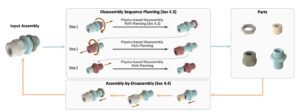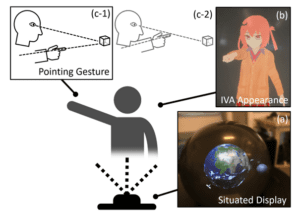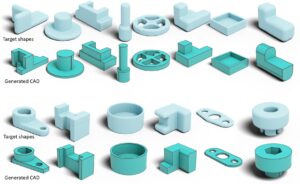Recently Published by Autodesk Researchers
Autodesk Research teams are active contributors in peer-reviewed scientific journals and in conferences around the world. Check out a sampling of some recent publications from Autodesk Researchers.
“Assemble Them All: Physics-Based Planning for Generalizable Assembly by Disassembly”

Published at ACM Transactions on Graphics (SIGGRAPH Asia Proceedings) this paper proposes a novel method that leverages the assembly by disassembly principle and physics-based simulation to explore a reduced search space in industrial manufacturing. The team’s method also generalizes to rotational assemblies, like screws and puzzles, to solve 80-part assemblies within several minutes.
“It’s Over There: Designing an Intelligent Virtual Agent that can Point Accurately into the Real World”

This paper was published at the Graphics Interface Conference in 2022 and explores how to design an intelligent virtual agent (IVA) that can point from the virtual to the real world and have users recognize where it is pointing based on perceptual cues. The team designed an IVA with factors including a situated display, appearance, and pointing gesture strategy.
“Learning Dense Reward with Temporal Variant Self-Supervision”
This paper, published at ICRA Workshop on RL for Contact-Rich Manipulation, looks at the role rewards play in reinforcement learning in complex, real-world robotic applications. The team focuses on using temporal variance to simulate the fluctuating state and action distribution of a manipulation task.
“Reconstructing Editable Prismatic CAD from Rounded Voxel Models”

Reverse engineering a CAD shape from other representations is an important geometric processing step, and this paper introduces a novel neural network architecture to solve this challenging task. Published at ACM SIGGRAPH Asia as part of the Technical Briefs Program, the team shares their method to reconstruct the input geometry in the voxel space to approximate the target shape more closely than other methods.
“Supercharging Trial-and-Error for Learning Complex Software Applications”
Published at ACM SIGCHI Conference on Human Factors in Computing Systems, this paper examines new techniques to support trial-and-error for learning complex software application. The team identifies benefits and challenges of trial-and-error, and introduces a framework with a conceptual model and design space.
Get in touch
Have we piqued your interest? Get in touch if you’d like to learn more about Autodesk Research, our projects, people, and potential collaboration opportunities
Contact us